General Pervez Musharraf
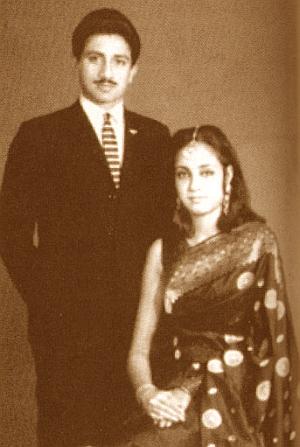 General Pervez Musharraf, the second of three brothers, was born in Delhi on August 11,
1943. His parents chose to settle in Karachi after the creation of Pakistan. He comes from
a middle class family, his father having worked for the foreign ministry. He spent his
early years in Turkey, from 1949 to 1956, owing to his father, the late Syed
Musharrafu-ud-din’s deputation in Ankara. He claims to speak Turkish Fluently.
He accepts Mustafa Kamal Ataturk as his hero.
General Pervez Musharraf, the second of three brothers, was born in Delhi on August 11,
1943. His parents chose to settle in Karachi after the creation of Pakistan. He comes from
a middle class family, his father having worked for the foreign ministry. He spent his
early years in Turkey, from 1949 to 1956, owing to his father, the late Syed
Musharrafu-ud-din’s deputation in Ankara. He claims to speak Turkish Fluently.
He accepts Mustafa Kamal Ataturk as his hero.
On return to Pakistan from Turkey, General Pervez Musharraf received his education from Saint
Patrick's High School, Karachi, and then from F. C. College, Lahore. In 1961, he joined
the Pakistan Military Academy and was commissioned in Artillery Regiment in 1964. He
fought in the Indo-Pakistan War of 1965 as a young officer, and was awarded Imtiazi Sanad
for gallantry. He also achieved the Nishan-i-Imtiaz (Military) and the Tamgha-i-Basalat.
He has been also on the faculty of the Command and Staff College, Quetta and the war wing
of (the) National Defence College. He volunteered to be a commando, and remained in the
Special Services Group for seven years. He also participated in the Indo-Pak War of 1971
as a Company Commander in the Commando Battalion.
A graduate of Command and Staff College, Quetta, General Musharraf also distinguished
himself at the Royal College of Defense Studies, United Kingdom. During his military
career, General Musharraf acquired varied experience in different command and
instructional appointments. He also served as Director General Military Operations at the
General Headquarters from 1993 to 1995.
General Musharraf
rose to the rank of General and was appointed as the Chief of Army Staff on October 7,
1998 when Pakistan's army chief, General Jehangir Karamat, resigned two days after calling
for the army to be given a key role in the country's decision-making process. General
Musharraf was given additional charge of Chairman Joint Chiefs Staff Committee on April 9,
1999. On October 12, 1999, when through a bloodless coup the military took over the
government in Pakistan, he became the head of the state designated as Chief Executive. He
assumed the office of President of Pakistan on June 20, 2001. In order to legitimize and
legalize his rule, General Pervez Musharraf held a referendum on April 30, 2002 thereby
elected as President of Pakistan for duration of five years. In accordance with the deal
with MMA (Muttahida Majlis-e-Amal), he agrees to leave the army on 31st December, 2004 but
will continue to serve five-year term as President as he got vote of confidence on January
1, 2004, from the parliament and the four provincial assemblies under the provision of the
17th Amendment duly passed by the National Assembly and the Senate.
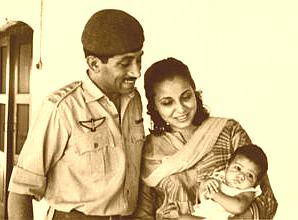 General Musharraf
got married in 1968 and has two children, a son and a daughter. He loves to spend most of his leisure time playing Squash, Badminton or Golf. He also
takes keen interest in water sports and has been an enthusiastic canoeist. He
calls himself an avid
reader, he is well versed in Military History, his favorite subject.
General Musharraf
got married in 1968 and has two children, a son and a daughter. He loves to spend most of his leisure time playing Squash, Badminton or Golf. He also
takes keen interest in water sports and has been an enthusiastic canoeist. He
calls himself an avid
reader, he is well versed in Military History, his favorite subject.
PROFILE
General Pervez Musharraf
Nishan-I-Imtiaz (Military),
Tamgha-i-Basalat,
Ex
President,
Islamic Republic of Pakistan

During the three years of
General Pervez Musharraf as the Chief Executive of Pakistan, the country saw more
structural reforms than at any time in its history. Ranging from economic and social
sector reforms to - administrative and political restructuring - improvements were carried
out in almost every conceivable facet of national life. At the time he assumed office of
the Chief Executive on 12th October 1999, the country was in deep economic and
constitutional crisis. His administration’s remarkable achievement of pulling the,
country out of the economic and political morass in a short span has been widely
acknowledged. On the international front, Pakistan’s‘ image saw a major
turnaround from the point where it faced diplomatic isolation.
General Pervez Musharraf was sworn in as the 11th President of
Pakistan and concurrently held with it the office of Chief Executive till 23rd November,
2002: After fulfilling his commitment to the people of Pakistan to hold general elections
in the country on 10th October 2002, he transferred the powers of Chief Executive to the
newly elected Prime Minister. On restoration of Constitution, he was administered fresh
oath of office of President on 31st October 2002.
President Musharraf, the second of three brothers, was born in
Delhi on 11th August, 1943. He spent his early childhood in Ankara, Turkey, where his
father was posted on a diplomatic assignment from 1949 to 1956. He was quick to pick up
Turkish language during his stay and developed fluency in a very short time. Upon his
return to Pakistan, he pursued his education at St. Patrick’s High School, Karachi.
He was at Forman Christian College, Lahore, when he got the call to join the Pakistan
Military Academy in 1961. From his college years, he has retained his keen interest in
water sports such as canoeing and sailing. He also spends his leisure time playing squash,
tennis and golf. An avid reader, General Musharraf is particularly well versed in military
history-his favorite subject.
President Musharraf was commissioned in an artillery regiment
in 1964. A graduate of Command and Staff College, Quetta, and the National
Defense
College, Rawalpindi, he, later in his career, returned to these internationally recognized
premier military institutions to serve as a faculty member. He-also had the distinction to
study at the Royal College of Defense Studies, United Kingdom.
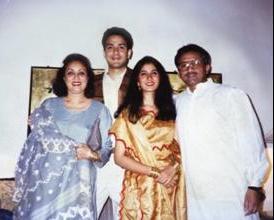 From the very start of an illustrious military career, General Musharraf excelled in his assignments. He received official recognition for valour and
bravery in action during the 1965 war. He was selected to serve in the elite Special
Services Group (SSG) “Commandos” and participated in the 1971 war as a company
commander in a commando battalion. On promotion to the rank of major general in January
1991, he was given the command of an infantry division and later of a prestigious strike
corps as lieutenant general in 1995. He was promoted to the rank of General on 7th
October, 1998 and appointed the Chief of Army Staff. He also held the additional charge of
Chairman Joint Chiefs of Staff Committee from April, 1999 to October, 2001.
From the very start of an illustrious military career, General Musharraf excelled in his assignments. He received official recognition for valour and
bravery in action during the 1965 war. He was selected to serve in the elite Special
Services Group (SSG) “Commandos” and participated in the 1971 war as a company
commander in a commando battalion. On promotion to the rank of major general in January
1991, he was given the command of an infantry division and later of a prestigious strike
corps as lieutenant general in 1995. He was promoted to the rank of General on 7th
October, 1998 and appointed the Chief of Army Staff. He also held the additional charge of
Chairman Joint Chiefs of Staff Committee from April, 1999 to October, 2001.
President Musharraf envisions Pakistan as a modern and
moderate Islamic state. His bold initiatives to ensure Pakistan’s steady progression
on the road to sustainable economic and social development have been internationally
praised. He considers people of Pakistan as the most precious asset and, therefore, has
always accorded special focus to human resource development in the country. A man who
loves peace, he has shown his predisposition to dialogue over confrontation and finding
just solutions to international disputes in accordance with UN resolutions.
He married Sehba Farid, on 27th December, 1968.
They have two children, a son and a daughter, both now married and settled in their
respective lives. General and Mrs. Musharraf are grandparents by virtue of their grand
daughters, Maryam and Zainab, from daughter, Ayla.
He is now the leader of
his All Pakistan Muslim Legue Party.
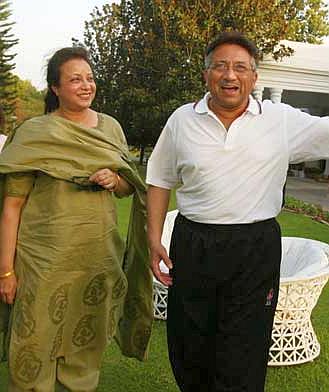
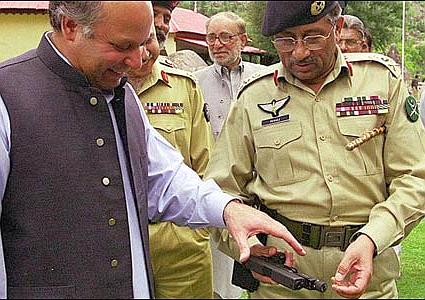
Impeachment movement and resignation of Pervez Musharraff
On 7 August 2008, the Pakistan Peoples Party and the Pakistan Muslim League
(N) agreed to force Musharraf to step down and begin his impeachment. Asif Ali
Zardari and Nawaz Sharif announced sending a formal request or joint charge
sheet that he step down, and impeach him through parliamentary process upon
refusal. Musharraf, however, said: “I will defeat those who try to push me to
the wall. If they use their right to oust me, I have the right to defend
myself." Musharraf, accordingly delayed his departure for the Beijing Olympics,
by a day. A senior coalition official told Reuters: "Yes, we have agreed in
principle to impeach him." The draft of the ruling coalition’s
joint statement had been finalized by the draft Committee, and Musharraf would
have to obtain vote of confidence from the National Assembly and 4 provincial
assemblies. The government summoned the national assembly, or lower house of
parliament, to sit on 11 August. Capt. Wasif Syed, spokesman for the
Pakistan People's Party—confirmed: "A decision has been made that he has to go
now, and all the parties have agreed on this point."[93]. It is speculated that
Pervez Musharraf would have had to face corruption and even murder charges if he
had kept refusing a graceful exit from the president house.
On Monday, 18 August 2008, in a speech defending his record, Musharraf
announced that he had resigned.
When announcing his resignation, Musharraf, 65, said: "After viewing the
situation and consulting legal advisers and political allies, with their advice
I have decided to resign. I leave my future in the hands of people. Not a single
charge in the impeachment can stand against me. No charge can be proved against
me because I never did anything for myself, it was all for Pakistan. On the map
of the world, Pakistan is now an important country, by the grace of Allah.
Whether I win or lose the impeachment, the nation will lose. They don’t realize
they can succeed against me but the country will undergo irreparable damage. My
resignation will go to the speaker of the National Assembly today.” In an
emotional one-hour speech, Musharraf raised his clenched fists to chest height,
and said, “Long live Pakistan!”
"Nonetheless, despite his mistakes, he has been that rare phenomenon in
Pakistani politics — an honest man with good intentions who tried to serve his
country to the best of his abilities. In a country that has suffered so much
over the years from corrupt and self-serving politicians, there have been too
few figures like him"
Approval ratings
In early 2007, Musharraf was extremely popular. According to a US survey, IRI
President General Pervez Musharraf was more popular in Pakistan than opposition
leaders Benazir Bhutto and Nawaz Sharif. Around 37 percent of the respondents
were of the view that Musharraf's supported PML-Q deserved to be re-elected.
However, by August 2007, after the lawyers Judicial Activism started,
Musharraf became slightly unpopular in Pakistan due to persistent media efforts
and anti-Musharraf talk shows. An International Republican Institute survey,
taken of 3000 people, showed that 64 percent of the population did not want
another term to be granted to Musharraf as the president of Pakistan.
Musharraf's popularity grew after his resignation and several pro-Musharraf
websites and groups on Facebook emerged.
In the most recent interview with Musharraf, Daphne Barak admits that she
receives mails and people have started missing Musharraf: "Many emails are
relatively flattering to you. I even have emails from PPP members who say that
they never thought they will miss you, but they do. Especially young people!"
Life after Presidency
After resignation, Musharraf went for an expected pilgrimage to Mecca. He may
also continue his travelling on a lucrative speaking tour through Middle East,
Europe and United States. Chicago-based Embark LLC is one of the international
public-relations firms trying to land Musharraf as a highly paid keynote
speaker.[98] According to Embark President David B. Wheeler, the speaking fee
for Musharraf would be in the $150,000-200,000 range for a day plus jet and
other V.I.P. arrangements on the ground.
Musharraf disclosed that he has planned to jump back into full time politics
but not until he moves into his newly constructed house in Chak Shahzad in
Rawalpindi/Islamabad as he does not want to misuse the army house for political
purposes.
His speech at the Amway Grand Plaza Hotel in January 2009 marked his first
U.S. appearance since he left office last year, as he embarks on a international
speaking tour. The former president of Pakistan pleaded for understanding in his
country's fight against terrorism, in a region deemed central to the outcome of
that battle. "Pakistan has confronted terrorism and extremism for more than two
decades now," Pervez Musharraf said in a speech to about 500 people at the World
Affairs Council of Western Michigan event.
Regarding the Lahore attack on Sri Lankan players, Musharraf criticized the
police commandos' inability to kill any of the gunmen, saying "If this was the
elite force I would expect them to have shot down those people who attacked
them, the reaction, their training should be on a level that if anyone shoots
toward the company they are guarding, in less than three seconds they should
shoot the man down."
Trial of Musharraf under Article 6
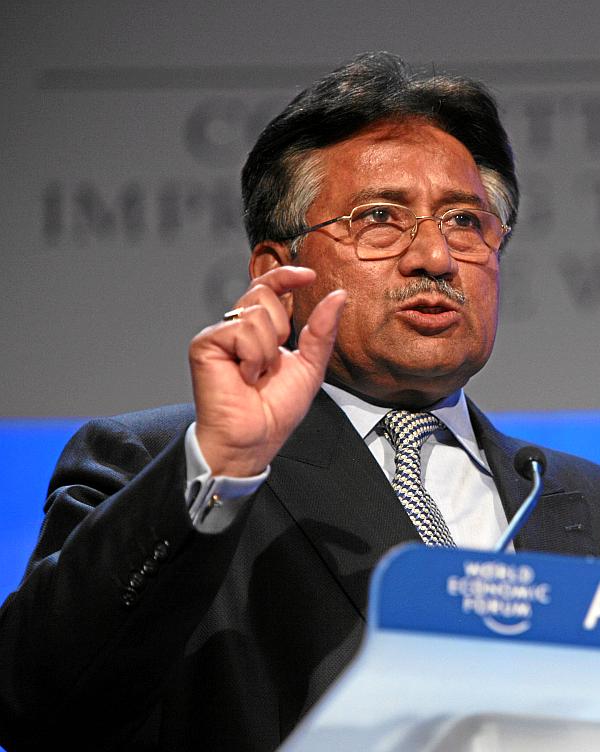
The
PML Nawaz have tried to get Pervez Musharraf to stand trial in an article 6
trial for treason in relation to the emergency on November 3, 2007[103], which
Musharraf signed as Chief of Army Staff instead of in his position as President
of Pakistan[104], yet revoked it as the President of Pakistan, also revoking the
PCO of 3rd November.
The Prime Minister of Pakistan Yousaf Raza Gilani has said a consensus
resolution is required in national assembly for an article 6 trial of Pervez
Musharraf “I have no love lost for Musharraf ... if parliament decides to try
him, I will be with parliament. Article 6 cannot be applied to one individual
... those who supported him are today in my cabinet and some of them have also
joined the PML-N ... the MMA, the MQM and the PML-Q supported him ... this is
why I have said that it is not doable,” said the Prime Minister while informally
talking to editors and also replying to questions by journalists at an Iftar-dinner
he had hosted for them.
Meanwhile, Proclamation of Emergency and Revocation is the constitutional
right of the President of Pakistan, according to the constitution of Pakistan,
Article 232 and Article 236.[108] On 15 February 2008, the Supreme Court has
delivered detailed judgement to validate the Proclamation of Emergency on 3
November 2007, the Provisional Constitution Order No 1 of 2007 and the Oath of
Office (Judges) Order, 2007.
Saudi Arabia have agreements in place to stop any article 6 trial in Pakistan
in relation to Pervez Musharraf according to the newspapers due to Saudi
Arabia's long standing friendship with all of the political parties in Pakistan.
Sharif is under tremendous pressure from Saudi Arabia to shun his demand for
Musharraf’s trial under the Article Six of the Constitution
The President of PML-Q, Chaudhry Shujaat Hussain has said that those vying
for article 6 against Musharraf to suffer and would themselves get embroiled in
trouble.[113] Secretary General of PML-Q Mushahid Hussain Sayed, also ruled out
Musharraf’s trial under Article-6 of the Constitution.
Cases against Musharraf
Abbottabad's district and sessions judge in a missing person's case passed
judgment asking the authorities to declare Pervez Musharraf a proclaimed
offender.
Edited and research by Jamal Panhwar


Advertise on this site click for advertising rates

